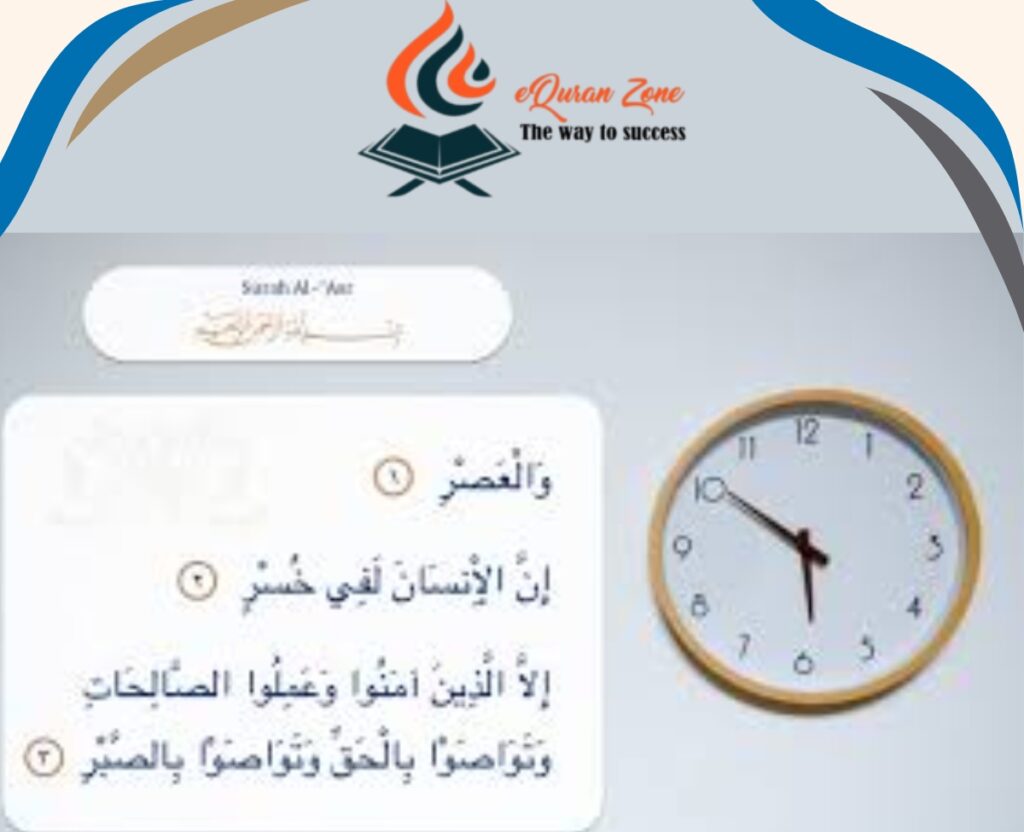Surah Al-Asr, the 103rd chapter of the Qur’an, holds profound meaning despite its brevity. Consisting of only three verses, it illuminates essential principles for living a successful and meaningful life. Its message revolves around the importance of time, faith, good deeds, urging truth, and practicing patience. This universal guidance applies to everyone, regardless of age, background, or cultural context. Through careful reflection on its meaning and lessons, Surah Al-Asr offers a roadmap to fulfill life’s spiritual purpose.
Unpacking the Meaning of Surah Al-Asr
Surah Al-Asr, which translates to “The Declining Time” or “The Epoch,” carries an oath at the very beginning. Allah swears by time itself, a finite and irreplaceable resource. The opening verse establishes the sacred nature of time, reminding humanity of its fleeting nature and the urgency of using it wisely.
The second verse begins with a stark declaration. It states, “Indeed, mankind is in loss.” This phrase highlights humanity’s natural trajectory toward loss unless proactive steps are taken to redirect this path. Time, once gone, can never be regained. Without proper action, the default state of life becomes one of missed opportunities and regret.
The third and final verse provides a solution to this universal dilemma. It identifies four qualities that create an exception to the state of loss. These are beliefs in Allah, performing righteous deeds, encouraging truth, and advocating for patience. Together, they form a holistic framework for navigating life’s many challenges while staying focused on one’s spiritual and moral goals.

Surah Al-Asr, Transliteration and English & Urdu Translation
بِسۡمِ ٱللَّهِ ٱلرَّحۡمَٰنِ ٱلرَّحِيمِ
Bismillah hir rahman nir raheem
اللہ کے نام سے شروع جو نہایت مہربان ، رحمت والاہے ۔
In the name of Allah, the Entirely Merciful, the Especially Merciful.
وَٱلۡعَصۡرِ
Wal ‘asr
زمانے کی قسم۔
By time,
إِنَّ ٱلۡإِنسَٰنَ لَفِي خُسۡرٍ
Innal insaana lafee khusr
بیشک آدمی ضرور خسارے میں ہے۔
Indeed, mankind is in loss,
إِلَّا ٱلَّذِينَ ءَامَنُواْ وَعَمِلُواْ ٱلصَّـٰلِحَٰتِ وَتَوَاصَوۡاْ بِٱلۡحَقِّ وَتَوَاصَوۡاْ بِٱلصَّبۡرِ
Illal lazeena aamanoo wa ‘amilus saalihaati wa tawaasaw bilhaqqi wa tawaasaw bissabr
مگر جو ایمان لائے اور انہوں نے اچھے کام کئے اور ایک دوسرے کو حق کی تاکید کی اور ایک دوسرے کو صبر کی وصیت کی۔
Except for those who have believed and done righteous deeds and advised each other to truth and advised each other to patience.
Timing as a Central Theme
Time, according to Islamic teachings, is not merely a resource but a central aspect of accountability. Each passing moment is part of life’s limited “capital,” and each decision contributes to either spiritual gain or loss.
Several interpretations of “Al-Asr” suggest layers of meaning. It may refer to the passage of eras, the declining day leading to sunset, or the afternoon prayer (“Salat Al-Asr”), symbolizing the transition from activity to reflection. Time is pressing, and its urgency compels us to act with purpose and awareness.
The metaphor of time as a melting block of ice is illustrative. Much like ice, time diminishes minute by minute. The wise person seeks to maximize each moment’s potential before it disappears forever. This concept aligns perfectly with the Qur’an’s profound encouragement to make the most of our finite lives for spiritual success.
The Lessons from Surah Al-Asr
The three verses of Surah Al-Asr present clear, actionable lessons. Each element contributes to a comprehensive guide for achieving a meaningful and fulfilling life.
Faith
Faith serves as the foundation. It roots the individual in a higher purpose and divine accountability, giving clarity to their actions. True belief goes beyond intellectual acknowledgment; it forms the core of a person’s motivation to act ethically and fulfill obligations.
For Muslims, faith involves belief in Allah, His messengers, His scriptures, the Day of Judgment, and divine decree. This conviction instills a moral compass, providing strength during adversity. Through faith, one accepts life’s challenges with trust in Allah’s greater wisdom.
Righteous Deeds
Faith must translate into action through righteous deeds. Deeds form the visible proof of an internal faith, demonstrating commitment and sincerity.
Acts of kindness not only uplift the individual but also benefit society collectively. The Qur’an repeatedly emphasizes the importance of almsgiving, honesty, fairness, and harmonious relations. Together, these deeds cultivate spiritual growth, spread goodness, and improve the quality of life for others.
Truth
Encouraging truth is a central teaching of this Surah. Truth represents the divine message transmitted through the Qur’an and the Sunnah of the Prophet Muhammad (peace be upon him). Adherence to truth entails living in alignment with Islamic teachings and avoiding dishonesty, deception, or injustice.
Promoting truth involves guiding others toward righteousness while standing firm in personal convictions. Those who embody truth become examples for their communities, inspiring justice and integrity. Although striving for truth sometimes brings opposition, it remains a critical dimension of faith and morality.
Patience
Patience (Sabr) is a virtue necessary for perseverance. Life is filled with trials, struggles, and challenges. Without patience, individuals may break under the weight of difficulties, leading them astray from faith and proper conduct.
This Surah highlights patience as essential for enduring calamities, resisting sinful desires, and maintaining devotion through hardship. True patience reflects a steadfast reliance on Allah’s will. It enables the believer to find hope amidst challenges, respond calmly to provocation, and rise above life’s tests with dignity.
Connecting Surah Al-Asr with Modern Life
Its universal message resonates in every sphere, offering guidance for personal fulfillment, ethical living, and resilience amidst contemporary challenges. Below are some areas where its teachings find direct relevance today:
Time Management
Modern lives demand balancing numerous responsibilities, often leading to stress and distraction. If calls for discipline in time management, prioritizing essential goals over transient distractions.
Combating Materialism
Materialism dominates many aspects of modern culture, often shifting focus from meaningful values to temporary pleasures. The admonition about “loss” warns against wasting life in trivial pursuits. Surah Al-Asr encourages redirecting ambitions from accumulating wealth to cultivating faith, family ties, and community relationships.
Advocacy for Integrity
Integrity has faced challenges in personal, professional, and public life. The teaching to “encourage truth” serves as a reminder to uphold honesty, transparency, and justice. It urges individuals to take principled stances and work toward a society built on ethical foundations.
Building Resilience
Life’s unpredictability has never been more evident than during global crises, such as pandemics or economic uncertainty. Patience, as emphasized in this Surah, is key to enduring such challenges without losing hope. It inspires individuals to persevere with faith, focus, and gratitude despite uncertainties.
Conclusion
It’s three verses that summarize the essence of human accountability, urging reflection on our purpose and priorities. For modern believers, success depends on applying these principles consistently in everyday life. The Surah aligns with modern concepts of goal-setting, personal discipline, and ethical behavior. It invites individuals to live balanced lives where faith enriches action, action uplifts communities, and patience sustains hope.
The interdependence of its four principles mirrors the delicate balance needed to thrive spiritually, emotionally, and socially. Faith anchors the soul, deeds reflect its application, truth ensures authenticity, and patience builds resilience. Together, they result in lasting success that transcends temporal gains.
By emphasizing time’s preciousness and offering clear values to live by, Surah Al-Asr remains as relevant today as it was upon revelation. Its lessons inspire believers to view every moment as an opportunity, every challenge as a test, and every action as an investment for eternal reward. Through its guidance, humanity finds a lasting antidote to the universal condition of “loss.”




